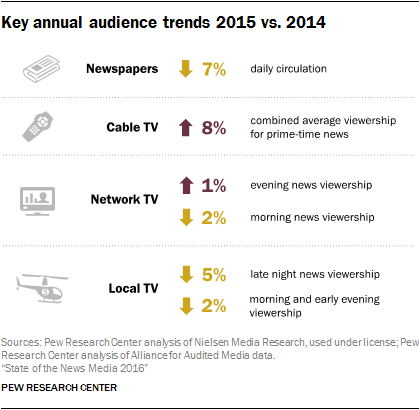The Truth is in danger! The Death of Investigative Journalism and What We Can Do About It. {Making Steemit A Journalism Hub}
I love long reads. In-depth long-form articles that talk about stuff that matter. In fact, I hunt them and have a special folder for them. (If you’re interested in them, check this)

So you can imagine my dismay when I came across the Pew Research Center’s THE STATE OF THE NEWS MEDIA 2016 REPORT.
It’s a 17page read and if you’ve got the time to dive in the rabbit hole. You can check it here:
However, here are a few takeaways:


In simple terms, these images means the main sources of quality reporting are dying. And this has a potential damage for us as a society.
Journalism’s crucial role in helping democracy function is sometimes forgotten amid the clamor of partisan debate and the messy nature of the news business.
Investigative Journalism
Investigative journalism is a form of journalism in which reporters deeply investigate a single topic of interest, such as serious crimes, political corruption, or corporate wrongdoing.
An investigative journalist may spend months or years researching and preparing a report. Investigative journalism is a primary source of information.
ELI5:
investigative reporting—uncovering wrongdoing through documents, data, interviews, and occasionally, undercover methods
The above definitions clearly show the huge benefits investigative journalism contributes to the society.
An investigative journalist:
Scrutinizes government and business practices and their effects on the society at large. This is done through:
Analyzing documents, such as lawsuits and other legal documents, tax records, government reports, regulatory reports, and corporate financial filings
Numerous interviews with on-the-record sources as well as, in some instances, interviews with anonymous sources (for example whistleblowers)
By doing this, investigative journalists keep governments and businesses in check. This, in fact, might be one of the reasons for their gradual demise…..stepping on the toes of the “too big to found guilty” corrupt entities.
Some important investigative journalism successes:
1971: The Pentagon Papers leaked and published by a military analyst named Daniel Ellsberg. He leaked a seven-thousand-page history of U.S.-Vietnam relations that had been prepared for internal use by the Pentagon.
2012: Charles Duhigg and his team’s Pulitzer’s prize winning research on The iEconomy….
As a direct result of the Times series: More than a million workers at the Chinese factories that make Apple’s iPhones and iPads got 25 percent raises. Their working conditions vastly improved after Apple’s supplier plants were opened to outside inspections for the first time.
2013: The Washington Post and The Guardian report on NSA surveillance
2014: Glenn Greenward and The Guardian team's work on the Edward Snowden whistle-blowing efforts. Their efforts also won the 2014 Pulitzer Prize for Public Service…
The most recent of these successes is the work of the International Consortium of Investigative Journalists publishing:
The Panama papers
A Giant Leak of Offshore Financial Records Exposing A Global Array of Crime and Corruption
Millions of documents showing how heads of state, criminals, and celebrities use secret hideaways in tax havens
Journalism isn't dying because it is in its nature. Journalism is dying because it is being murdered
One of the major conclusions of the 2016 report is that the media industry is dying. Profits are dwindling and companies are filing bankruptcy or being merged.
An aftermath of this is the gradual death of Journalism as a whole and investigative journalism to be specific.
It is being sped along by politicians that have sought to close the mind of the public. It has been abetted by executives that have snatched up portfolios of newspapers as though they were trading cards, who liquidate jobs for bonuses but blame the company's financial struggles on employees.
There are numerous examples online to buttress how bad it has become:
The journalist who lost his editor job in a media company and had to settle for a bland blog posts writing job in Hubspot --see his book Disrupted: My Misadventure in the Start-Up Bubble.
Pulitzer Prize-winning Rob Kuznia went to work in PR in order to make ends meet
More importantly, a special report by the Index on Censorship magazine: Danger in Truth: Truth in Danger reveals several techniques that are being used to stop journalists from covering the news and finding the truth. From being tagged as extremists to physically assaulted, journalists (esp investigative journalists) are fast becoming endangered species and truth is danger…..
There are two major reasons why I believe we’re witnessing the death of investigative journalism
THE RISE OF MEDIA CONGLOMERATES
In 2010, I vowed I was always going to take any news item on the media with a pinch of salt. Why?
TheGuardian published an article detailing how Rupert Murdoch’s media conglomerate control over a fifth of UK news consumption. Now these are not a collection of small regional companies….. Murdoch companies include News Corp and Sky. Media giants in their own individual right.


Also, a 2012 research reveals that 6 Media Corporations control 90% of the Media in America.
Here are a few snippets:


Investigative journalists are usually subjected to harassment in their search for the truth. And on occasions where their findings might cause potential damages to the Media owners and their political allies. Such researches are killed and never see the light of the day.
THE INTERNET
In the 21st century, there is a certain fate that befalls all traditional structures- big companies who deem themselves “too big to fail”… They are “innovated away”….
One of the highlights of the State of The Media 2016 report is the rise of Social Media sites and other websites as the primary source of the internet.
Traditional media sources are to be solely blamed for this. There are several reports that show that they all had the first mover opportunity to embrace the internet and its attendant technologies…. Instead, they fought against it and put in place obstacles that would inhibit the spread on the web. And they failed. Woefully.
It’s saddening that it’s when faced with dwindling profits that traditional news media are now embracing social media….
With dwindling profits, research projects are being stopped and journalists are being retrenched or sacked.
The industry supports nearly 33,000 full-time newsroom employees. Indeed, newspapers employ 32% of daily reporters stationed in Washington, D.C. to cover issues and events tied to Congress, as well as 38% of the reporters who cover statehouse legislatures. Still, smaller budgets have continued to lead to smaller newsrooms: The latest newspaper newsroom employment figures (from 2014) show 10% declines, greater than in any year since 2009, leaving a workforce that is 20,000 positions smaller than 20 years prior. And the cuts keep coming: Already in 2016, at least 400 cuts, buyouts or layoffs have been announced. Ownership trends show further signs of devaluation as three newspaper companies – E.W. Scripps, Journal Communications, and Gannett – are now one. And the recently renamed Tribune Publishing Co. spent much of the spring of 2016 fending off an attempt by Gannett to purchase them as well.
Social Media 2.0 Behemoths invest so little in boosting research and yet, still decide who gets paid… FACEBOOK, GOOGLE, TWITTER, AND PINTEREST ARE THE NEW KINGMAKERS …
It has been evident for several years that the financial realities of the web are not friendly to news entities, whether legacy or digital only. There is money being made on the web, just not by news organizations. Total digital ad spending grew another 20% in 2015 to about $60 billion, a higher growth rate than in 2013 and 2014. But journalism organizations have not been the primary beneficiaries. In fact, compared with a year ago, even more of the digital ad revenue pie – 65% – is swallowed up by just five tech companies. None of these are journalism organizations, though several – including Facebook, Google, Yahoo, and Twitter – integrate news into their offerings.
The remaining journalists are forced to compete for a finite number of eyeballs focusing on quantity over quality.
There are various reports where journalists have been forced to compromise the truth to boost sensationalism.
CLICKBAIT NEWS ARTICLES HAVE TAKEN OVER AND QUALITY REPORTING IS DYING
Media outlets care more about driving ad revenue/profits, and get that by running listicles, clickbait, celebrity news, etc. rather than paying people to take lots of time to research and write lengthy, serious articles about important issues
There Might Be a Way Out… And Why I Think There’s Hope
It's not all doomy and gloomy, though. And all hope is not lost. A recent study by TheGuardian shows that some high-quality investigative reporting is ongoing. A very good example is a story by Mariah Blake: Welcome to Beautiful Parkesburg, West Virginia. Home to one of the most brazen, deadly corporate gambits in U.S history
WHAT Do THESE TWO INDUSTRIES BOTH HAVE IN COMMON?
THE BOOK INDUSTRY
FILM PRODUCTION
They were innovated away by the Internet. And despite having the first mover advantage, they scuttled it and wanted to inhibit its growth so as to maintain their gatekeepers status.
At the end, innovation and the Internet won:
Self-publishing saved the book industry and authors
Indie crowd-funding saved great products and film production
And even on Steemit, we’re having the launch @pharesim’s PEVO –.a decentralized long-term digital archive for scholarly publishing through the open access paradigm and a web platform facilitating continuous open evaluation.
We even have a Ph.D. dropout who is moving her research to Steemit.
IF THE INTERNET IN A WAY KILLED INVESTIGATIVE JOURNALISM, THEN STEEMIT AS A DECENTRALISED PLATFORM CAN/SHOULD SAVE IT TOO
Making Steemit A Journalism Hub
Investigative journalism is very expensive. Journalists not only risk their lives but also spend weeks, if not months, traveling, lodging in hotels and seeking and sometimes, paying sources.
These expenses run into thousands of dollars….and we might not be able to properly fund them on Steemit.
However, they can use the platform for:
Full publications when the magazine they publish in wants to remove parts
For republications
It could be even used by whistleblowers and their journalist partners
Or a sort of “indie” projects that are not too expensive to produce.
H.T : @phareism
They (investigative journalists) do what they love without force or fear. We support them and get what we want- quality unbiased reporting on issues that affect us as a society
A win-win situation for both parties.
Over to you:
The main goal of this post is to encourage discussions about the state of journalism in general. The truth is truly in danger and we all have a part to play in ensuring it lives.
Do you have suggestions on how journalists can be invited to try out the platform? Would love to hear from you.
Sources:
https://en.wikipedia.org/wiki/Investigative_journalism
http://www.journalism.org/2016/06/15/state-of-the-news-media-2016/
http://www.eurekalert.org/pub_releases/2016-07/s-tii070716.php
http://ioc.sagepub.com/content/45/2/6/F1.expansion.html
https://www.sciencedaily.com/releases/2016/07/160710212814.htm
http://ioc.sagepub.com/content/45/2/6/F1.expansion.html
http://trofire.com/2015/08/30/corporate-america-thought-it-killed-investigative-journalism-wrong-huff-post-intercept-and-other-social-media-are-now-here/
https://www.reddit.com/r/explainlikeimfive/comments/3vbs2j/eli5_why_is_investigative_journalism_considered/
https://revisionworld.com/a2-level-level-revision/sociology/mass-media-0/ownership-and-control-media
http://www.huffingtonpost.ca/dave-yin/journalism-isnt-dying_b_9043884.html
https://www.theguardian.com/media/organgrinder/2010/dec/30/murdoch-to-control-22percent
http://www.usatoday.com/story/money/business/2015/06/11/what-rupert-murdoch-owns/71089066/
http://www.brookings.edu/blogs/brookings-now/posts/2014/10/ten-noteworthy-moments-in-us-investigative-journalism
http://ioc.sagepub.com/content/current #steemit
http://www.businessinsider.com/these-6-corporations-control-90-of-the-media-in-america-2012-6
https://media.illinois.edu//knight/future-of-investigative-reporting
@infovore great article there and well-cited. I am the PhD dropout btw. Just a few cents what i think:- I believe that most journalists are in fact not driven by money, but a sense of duty to uncover and show to outside world the ugly truth. Steemit has a high sign up rate and the potential REACH outside to the world is high. So it is in fact, a great platform to raise awareness without any barriers and costs.
Yeah @coinbitgold . I know. I read your article the other day and it was fantastic.
I believe that most journalists are in fact not driven by money, but a sense of duty to uncover and show to outside world the ugly truth. That would be super awesome. So in a way, Steemit could just serve as a means to keep body and soul together. And they can do away with media houses that want them to sell their soul for peanuts. Would love to hear a journalist view on your thought.
I have bad memories about journalists
My mother died while covering the news T_T
newspapers patrol at indonesia,th 2016
@infovore Thanks :-)
I am not a journalist unless you can count a school magazine reporter lol
And so i believe journalists' decision to use steemit or not will greatly depends on few things:
If their news can spread faster than other social media and media houses, then i believe besides money, this can be a huge motivator for them.
I don't know if i have crossed my limit of up-votes, but fuck it you deserve it :)
Ha! Thanks so much. I really appreciate. ;)
You are very welcome 😀 But in all thank you....i mean the fact that its making the trending page just means i was right in voting for you. Keep it up👍🏽
You're totally right. Steemit does have the capacity to be an independent haven for this type of journalism.
I propose the following:
There should be a tag that only authorised users can use, like #realjournalism.
Users can only gain authorisation to use that tag by showing a body of work elsewhere or submitting an article that is deemed to be high enough quality by an editor.
Why?
I love your recommendations. And you're right. We can beta invite a few journalists to see how this experiment works out. And a well-monitored tag will help convince them Steemit is the real deal. Would love to see how this is going to be implemented.
Hi, am really interested by this topic - I'm a freelance journalist and wrote an introductory post at the start of this week discussing some similar issues. Would love to talk more about how it could work in practice!
Interesting gossip: .
Incentivizing non click bait, ad-ridden, hyperbolic journalism could be one of Steemit's greatest assets. I have faith the dev team will do right on this. If not, someone else will.
The reason classic journalism is dying is because it is just parroting the mainstream world-view and superficial news.
Investigative journalism is rare. Pieces of investigative journalism are only used as a small percentage, typically to add legitimacy to the dominate percentage of ordinary news. And even modern-day investigative journalism may be politically oriented, like investigating the "bad deeds" of a foreign regime that our country doesn't like, investigating "hot" issues that have a political appeal in favor or against certain positions, etc.
But traditional journalism's nail on the coffin is the Internet and how the content is turned from "push" (media to people) to "pull" (people choose what they want to read). As long as the media could dominate our decisions, they didn't have "competition". Now that they do, they have a problem.
Now, having said that, people working in these organizations may indeed face issues. Along with them the few honest investigative journalists. Can they be saved by a platform like steem? I guess we'll find out.
One thing though that is exciting is the possibility to eliminate "middle-men" like wikileaks. I know people don't perceive them as "middle-men", but in a sense they are. And being an intermediate structure means they can be censored or they could compromise the whistleblower. Now the whistleblowers have more direct access in publishing their stories. Plus financial support (if they need it).
Thanks so much for this . You perfectly captured the state of journalism in the world today. Hopefully, gatekeepers and middlemen can be skipped in the near future.
It's the power of decentralization.
What an amazing post to stumble across late at night (an hour after I took my seizure meds i.e. right before I have to crash into bed - so I'll have to come back and add my coherent thoughts tomorrow). This is an excellent proposal and I'm 1000% behind it. I'm an NYU Journalism school grad and worked my way around the globe doing freelance journalism gigs at various papers and magazines. My real passion has always been critical writing but of course the demand for that is virtually zero these days. When I was in high school part of our graduation requirement was a senior internship - most kids went with no-brainers like Kinkos or local ice cream stores because fuck it, it was spring semester and college acceptance letters were already in. Mine was with the Philadelphia Inquirer and my mentor was my friend's dad who was a Pulitzer Prize-winning investigative war correspondent who had seen combat in virtually every major violent conflict since Vietnam (my friend was born in a bombed-out hospital in 1982 in Beruit). He had written part of the book that the movie "Black Hawk Down" was based on. I started my internship by helping proofread his multi-article series about drug lord raids in Colombia. He was amazing and wrote exactly the kind of stuff I wanted to write: meaty, weighty, meaningful journalism the way journalism was meant to be.
I think Steemit could be useful in a number of ways, maybe as a means of fostering the freelance journalism community which has been suffering so much lately? As a platform for crowdsourcing investigative projects with one or two or more main writers? I'll come back tomorrow when the Topamax and Lamictal aren't making me loopy lol.
Wow! Glad to hear from someone in the trade... I have no journalism experience whatsoever but it pains me that such an important job in the society is treated with levity. Can't wait to hear more from you tomorrow. Stay strong :)
So I definitely think Steemit could be the perfect platform for crowdsourced investigative journalism. It would provide financial compensation - which, let's face it because we have to be honest, is one of the two greatest threats to the field (lack of fair compensation and lack of journalistic integrity being the other). And it would dramatically cut down the time it takes to put a story together from start to finish. Investigative journalism entails an enormous amount of legwork: there is an endless process of running around, tracking people down, pursuing leads, waiting on phone calls, wasting time on dead ends...not to mention the time actually spent on writing the piece itself. Crowdsourced journalism would allow members to contribute pieces of the story collaboratively while working simultaneously on their own leads, then adding their information to the group thread (via the comments?...not sure how else to keep it all collated) for the head writer or writers to compile into the final article. This allows the reporter to conduct interviews, connect with sources on the ground and pick up pieces of insider info from virtually all over the globe, and ensures each participant will be compensated fairly for their contribution. Important stories will get the coverage they desperately need, but in the thoughtful, in-depth format that classic critical journalism can provide, which is normally too time-consuming to produce to keep up with today's internet-based deadlines.
I'd love to add some really in depth political investigations. There are thousands of emails from wikileaks that need sorted and I'd love to have a group dedicated to doing that investigation.
Please do. You could have be the first person advantage and build reputation that way. Looking forward to reading your posts.
Classic investigative journalism is expensive as it usually takes a long time before an article is ready to be published. Traditionally, newspapers could offset these costs through their sales and advertising income, which has been declining with the rise of the Internet. Steemit could become an independent news channel and compensate good journalists for their hard work.
I agree. The truth is truly expensive. Newspapers are currently facing dwinding profits and TBH its not changing any time soon. Steemit can be a source of complimentary income for big time journalists and even a full time income for upcoming investigative journalists.
Fantastic article! One of the very best on Steemit thus far.
Journalism is in the absolute doldrums. Today, journalism is all about an echo chamber that vapidly repeats useless opinions and rumors with very little fact checking or corroboration. Things are moving to the internet, where it has become all about clickbait headlines and a quick buck for minimum effort.
You're absolutely right, Steemit has the potential to change all this. But it's a risk for a journalist. What if the post they worked on for months goes into the void? But yes, long term, I think these things will work out fine.
Thanks for the compliment. I agree with you. And yes, its a risk. But journalists who adhere to the truth would embrace this risk rather than selling their souls for little or no gains....It aint that easy though.
Yes, but I feel that's the only way it can be done. You're not a true journalist until you seek out the truth, no matter what. Recycled clickbait articles are forgotten in hours.
Certainly though, I do think something like Steemit has the best opportunity for recognition and financial incentive. Hardline investigative journalists will never survive in the mainstream media today.
I hope we see a new generation of investigative journalists who reach their audience through social media.
I hope so too.. Can't wait to see how this proposal is implemented.
I'm glad to read this and realize that others have seen the potential for steemit and other blockchain-based ledgers as an avenue for recording the truth. I live in a country where the media is heavily collared, and journalists are routinely jailed for reporting about the wrong (right) person, to the point where self-censorship is pervasive in all who write. It's a sad and scary state of affairs when the truth is no longer able to be told.
Its truly a saddening state. Journalists are endangered species these days. There is just so much evil in the current world that those who are willing to call them out are immediately trampled.....
This is even more saddening if that censorship is from a govt thats expected to be accountable to the citizens. Stay strong bro.